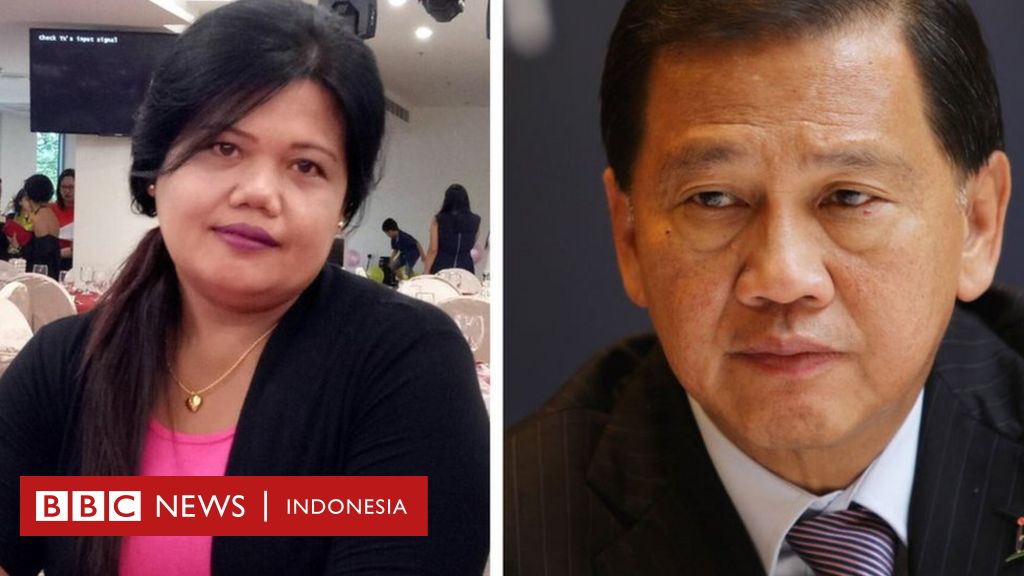3 hours ago
Image source, Parti Liyani / Getty
—
The party (left) worked for Liew Mun Leong (right) for several years
–
Parti Liyani is a domestic helper (PRT) from Indonesia who is paid around S $ 600 (Rp6.5 million) per month by a super rich family in Singapore.
–
Meanwhile, Liew Mun Leong is his boss, a businessman who leads a number of large companies in Singapore.
–
One day, the Liew family accused the Party of committing crimes, from stealing luxury handbags and DVD players clothes.
–
They reported the woman to the police – charges that culminated in court and received public scrutiny.
–
Earlier this month, Parti Liyani won the case.
–
“I am very happy that I am finally free,” he told reporters through an interpreter. “I’ve been fighting for four years.”
–
But his case has raised questions about inequality and access to justice in Singapore. Many have wondered how he could be brought to justice in the first place.
–
Parti started working at Liew Mun Leong’s home in 2007. There, several members of Liew’s family lived, including Liew’s son, Karl.
–
In March 2016, Karl Liew and his family moved to another place of residence.
–
Court documents detailing the sequence of events state that Parti was asked to clean up Karl’s new home and office on “several occasions” – violating local labor regulations, and to which Parti had previously complained.
–
A few months later, Liew’s family notified Parti that he was fired on suspicion of stealing from them.
–
He was given two hours to pack his belongings into boxes which were to be sent by the family to Indonesia. He was flown to Indonesia on the same day.
–
As he packed up, he threatened to complain to the Singapore authorities for being asked to clean Karl’s house.
–
The Liew family decided to check on the items to be shipped after the Party left. They claim to find their belongings inside.
–
Liew Mun Leong and his son filed a police report on October 30.
–
Parti said he didn’t know about this – until five weeks later when he returned to Singapore to find a new job, and was arrested on arrival.
–
Unable to work due to criminal proceedings, she lives in a migrant worker holding center and depends on them for financial assistance as the case progresses.
–
Cross-dressing and pink knife
The party is accused of stealing various items from Liew including 115 pieces of clothing, luxury bags, a DVD player and a Gerald Genta watch.
–
In total, the goods are worth S $ 34,000 (Rp367 million).
–
During the trial, Parti confessed that the items were his own, items he had found, or items he did not pack himself into the box.
–
In 2019, a district judge found him guilty and sentenced him to two years and two months in prison. The party decided to appeal the decision. The case continued earlier this month when the Singapore High Court finally acquitted him.
–
Judge Chan Seng Onn concluded that the family had “inappropriate motives” when filing charges against him, but also highlighted several issues regarding how the police, prosecutors and even district judges handled the case.
–
He said there was reason to believe that Liew’s family had filed a police report against Parti to stop him from filing a complaint that he was being asked to work illegally to clean Karl’s house.
–
The judge noted that many of the items Parti allegedly stole were actually damaged – such as a watch that had a missing button, and two non-functional iPhones – and said it was “not uncommon” to steal items that didn’t work.
–
In one example, the Party was accused of stealing a DVD player, which the Party said was discarded by the family for not working.
–

Image source, HOME
—
Parti is accused of taking a DVD player
–
Prosecutors later admitted that they knew the machine could not play the DVD, but did not disclose this during the trial when the items were used as evidence and proved to be functioning in other ways.
–
This drew criticism from Judge Chan who said they had used “magic techniques … [yang] very detrimental to the defendant “.
–
In addition, Judge Chan also questioned the credibility of Karl Liew as a witness.
–
Liew, who is younger than the Parti, accused the housekeeper of stealing a pink knife he allegedly bought in England and brought back to Singapore in 2002.But he later admitted that the knife had a modern design that could not have been produced in Britain before 2002.
–
He also claims that various clothes, including women’s clothes, found in Parti’s possession actually belonged to him – but then couldn’t remember whether he owned some of them.
–
When asked during the trial why he had women’s clothes, he said he liked doing cross dressing (wearing another kind of dress) – a claim that Judge Chan said was “very unbelievable”.
–
Judge Chan also questioned the actions taken by the police – who did not visit or see the scene until about five weeks after the initial police report was made.
–
The police also did not offer a translator who could speak Indonesian, and instead offered a translator who could speak Malay, another language Parti did not normally use.
–
“The actions of the police in the way they are handling the investigation are very worrying,” Eugene Tan, Professor of Law at Singapore Management University, told BBC News.
–
“The district judge appears to have prejudiced the case and failed to see the failure of the police and prosecutors.”
–
Pertarungan David versus Goliath
–
This case attracted public attention in Singapore and most of the people were angry with Liew and his family.
–
Many consider this case as an example of the rich and the elite oppressing the poor and powerless, and living by their own rules.
–
Although justice ultimately prevailed, among some Singaporeans, it shook long-held beliefs about justice and an impartial legal system.
–
“There has not been a case like this yet,” said Prof. Tan.
–
“The apparent systemic failure in this case has caused public unrest. The question that arises in many minds is: What if I am in his position? Will the case be investigated fairly… and impartially?
–
The fact that the Liew family was able to make the police and lower courts believe in false accusations raises legitimate questions about what the system is check and balances (control and balance) is sufficient. “
–
Following public protests, Liew Mun Leong announced his resignation from his position as chairman of several prestigious companies.
–
In a statement, he said he “respects” the High Court decisions and believes in Singapore’s legal system.
–
But he also defended himself in regards to his report to the police, saying: “I firmly believe that if someone is suspected of wrongdoing, it is our duty as citizens to report the matter to the police”.
–
Karl Liew has remained silent and has not released any statement on the matter.
–
The case has triggered a review of police proceedings and prosecution. Minister of Law and Home Affairs K Shanmugam admitted “something was wrong in the series of events”.
–
What the government does next will be watched very closely. If the government fails to meet Singaporeans’ demands for “greater accountability and systemic justice,” this could lead to a “worrying perception that elites are placing their interests ahead of society’s,” wrote Singaporean commentator Donald Low in a recent essay.
–
“If this is not resolved satisfactorily, the work of domestic assistants, lawyers, activists and judges will be in vain.”
–
The case also highlights the problem of migrant workers’ access to justice.
–
Parti was able to stay in Singapore and fight for his case because of support from non-governmental organization Home, and lawyer Anil Balchandani, who acted pro bono but estimated the legal costs could be up to S $ 150,000 (IDR1.6 billion).
–

Image source, Home/Grace Baey
—
Balchandi and Parti faced this case for years.
–
Singapore does provide legal aid to migrant workers, but workers are usually the backbone of the family, so many of those who face legal proceedings often decide not to take issue with their cases because they don’t have the luxury of not earning for months or years, said Home.
–
“The party is represented by lawyers who … are fighting steadfastly against the power of the state. The unequal power of the legal force looks very striking,” said Prof. Tan.
–
“It was David’s fight against Goliath – with David emerging victorious.”
–
As for the Party, he said he would now return home.
–
“Now that my problem is gone, I want to return to Indonesia,” he said in an interview.
–
“I forgive my employers. I just want to tell them not to do the same to other workers.”
—


